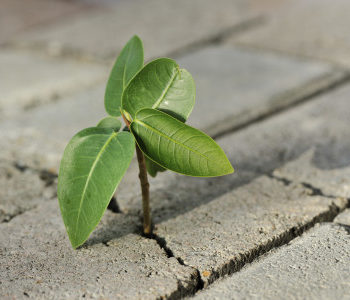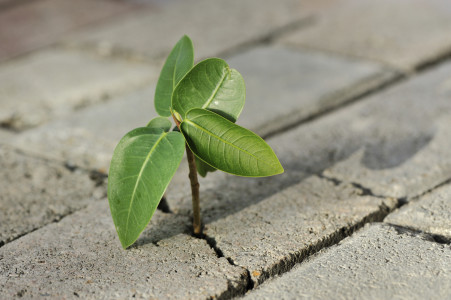
 Comfort can be nice. But these days, it’s good to be prepared for the ups and downs we all face or will face eventually.
Comfort can be nice. But these days, it’s good to be prepared for the ups and downs we all face or will face eventually.
“Comfort is the enemy of achievement.” – Farrah Gray
What I have realized is that while we should be grateful for each and every “normal” and “boring” day, we should make some attempt to stretch ourselves. To find a way to become more resilient. Especially if we want to improve our the quality of our life.
resilience
: the ability to become strong, healthy, or successful again after something bad happens
: the ability of something to return to its original shape after it has been pulled, stretched, pressed, bent, etc.
For some, being resilient comes from experience. Some of us experience turmoil in our childhood or have been through a divorce, a business crisis or career chaos, which can make us more resilient. For others, it’s not so easy.
Is it possible to learn to become more resilient without having to go through crisis, pain or suffering?
The answer is something I have thought about deeply.
What I have realized is that while nothing can replace the experience of bouncing back, we can learn traits and behaviors which can build our resiliency muscle.
Nothing can replace the journey of a tough life to teach us how to become more resilient but that doesn’t mean we shouldn’t try especially if we’re feeling comfortable.
Here are 5 lessons I have learned about how we can shift our thinking to help us become more resilient:
1. Constantly believe in yourself
Self confidence doesn’t have to come from a place of hope but from an understanding that no matter where we are in life, we have something to offer. We have a contribution to make and that each of us has within ourselves a skill, an asset, a passion, an emotion that can help us achieve a greater level of success and happiness. By reinforcing a sense of self worth each day, we are building up our resiliency reserves.
2. Think more about your strengths
About a dozen times a day, our mind automatically entertains thoughts of negativity. We tend to think about our weaknesses. “I can’t possibly earn as much money as she does.” or “I don’t have the right education or I’m not as lucky”. These thoughts are just plain wrong! How do we really know?!
Instead of allowing our mind to even consider these thoughts, cut off the negativity by pointing to what we are capable of. Think about the strengths not the weakness. Better yet, write down 3 things you’re good at right there on the spot. Write on a piece of paper, “I am really good at _______” fill in the blank.
All of us have something we’ve learned to do that makes us special. It doesn’t matter if others can do it – what matters is that we have capabilities. Pointing that out to ourselves feeds our mind seeds of strength that will blossom into the flowers of resiliency.
3. Learn something new
Putting ourselves in a new situation fires new neurons in the brain. It expands our belief system about what’s possible.
One way I live this principle is by traveling to a place I’ve never been before. I sign up for a seminar or a conference in a new city. I meet new people who challenge me and I get to hear their life journeys.
Taking a night class about photography, reading in a book club or going back to school offers us something to look forward to.
I once signed up for an 8 week class, one night per week. I liked it but was tough to go to after a hard day’s work. But I kept going because I looked forward to seeing my classmates. It became fun. Creating a sense of optimism about learning is key in order to become more resilient. People who are resilient are more hopeful than they are pessimistic.
4. Get a resilient point of reference
Thousands of stories exist about people who have achieved greatness through much adversity. Reading a personal story (biographical books are great) gives our mind a point of reference…a hero who teaches us how to become more resilient.
We get to learn their thoughts and mindset. The imagery our mind creates can bring out emotions within us. These thoughts and emotions can be brought to the forefront during times when we face a challenge.
I often think about stories of people who have gone through health challenges and resolved to keep going. From athletes to cancer survivors or even those around us – our parents or family members can offer us resiliency points of reference. Their stories offer us hope, inspiration and reinforcement in a belief that it is possible to bounce back from anything.
5. Challenge Yourself
Sign up for something – a project or a specific goal that seems difficult. Something that is compelling enough that gets us off our back to take action.
One way to do this is to sign up for a challenging athletic event. One of those “Tough Mudder” courses can be a powerful way to build up resiliency “credits”. Maybe it’s a business goal not a physically challenging one.
Whatever the challenge, the intent here is to challenge our mind and our body by using external forces to make ourselves think and act in a way that is different from our current mindset.
Breaking the pattern of beliefs or traditional thinking by challenging yourself each day can be a powerful way to become more resilient.
Ultimately, resiliency is not something we can acquire overnight.
Tweet this: Resiliency is something we uncover, discover and unlock when faced with seemingly overwhelming challenges. We already have it—we just have to let it out.
Bob Miglani | Embrace the Chaos | How to become more resilient | March 2014
